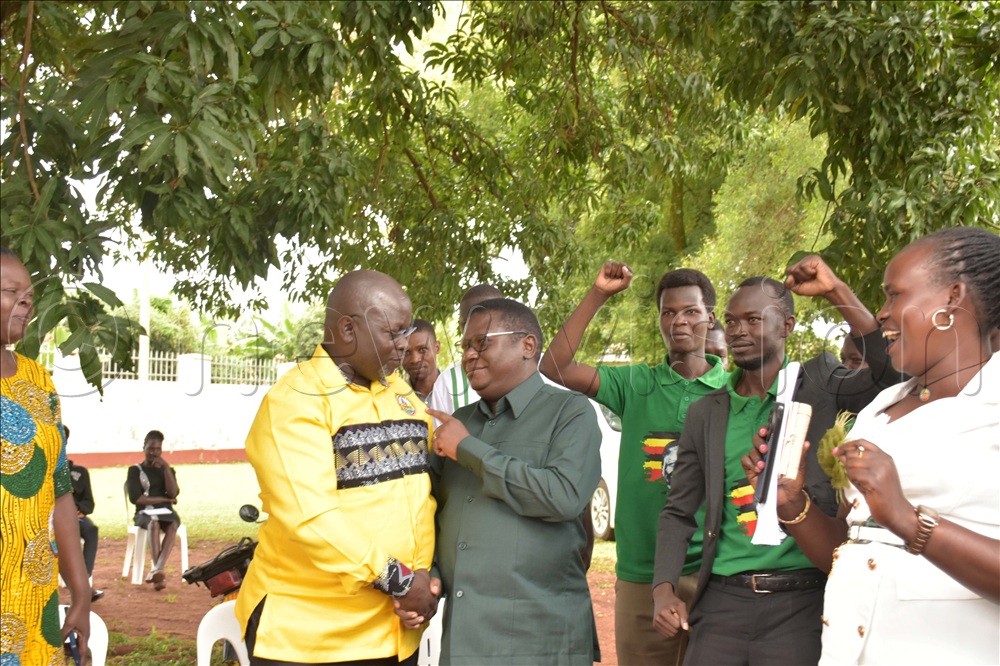DP’s Mao eyes Parliament once again with Pece-Laroo MP race
The nomination confirms months of widespread speculation, ending uncertainty over the veteran politician's parliamentary ambitions.
Democratic Party (DP) president general Norbert Mao signing in a book before his nomination at the returning officer's office. (Photos by Claude Omona)
________________
Democratic Party (DP) president general Norbert Mao was on Wednesday officially nominated to contest for the Member of Parliament seat for Pece-Laroo Division in Gulu city.
The nomination confirms months of widespread speculation, ending uncertainty over the veteran politician's parliamentary ambitions.
The moment was met with significant jubilation in Gulu, marking a new chapter in Mao's long and often turbulent career. He was accompanied during the process by his wife, Beatrice Nambi Mao.
Mao explains comeback
Following his successful nomination, Mao was quick to explain the strong reasons behind his decision to contest for the Pece-Laroo seat, citing a drastic deterioration in regional leadership.
“The level of leadership and representation has gone down in the region,” Mao asserted.
He openly accused most current Members of Parliament of having "betrayed their voters" while serving in the national assembly.
Mao stated unequivocally that he could not stand by and watch constituents go unrepresented.
Addressing the controversial relationship between his party and the ruling National Resistance Movement (NRM), Mao vigorously defended the DP-NRM cooperation agreement as being ultimately for the benefit of the people of Uganda.
“The political atmosphere of Uganda is changing every day, and the cooperation that we have is to plan ahead,” the DP president general stated, framing the alliance as a strategic, forward-looking necessity.
Mao then issued a striking warning, hinting at a larger purpose for his candidacy.
He warned that his intention to vie for the Pece-Laroo Division harbours a secret that will trigger a massive political change in Uganda.
Mao will face incumbent Fr Charles Onen, who was also nominated on Wednesday, as well as NRM's Tony Kitara, among others.
Local jubilation, mandate stressed
The excitement on the ground underscores the strong grassroots connection Mao maintains with the Acholi sub-region. Local supporters emphasised his national stature, coupled with his proven track record in Gulu.
Democratic Party (DP) president general Norbert Mao with Tony Kitara, the NRM flag bearer for Pece-Laroo Division in Gulu city.
Thomas Layee Ting, a long-time DP supporter, told New Vision that Mao’s decision to seek a local constituency mandate is viewed as a definitive commitment to local representation.
“Mao is a prominent national figure and a former MP for Gulu Municipality and LC5 Chairman for Gulu District. His return is a strong commitment to representing their interests and bringing his national influence back to the local level,” Ting stated.
Mao’s earlier record as a tireless peace crusader and highly effective local government leader remains deeply resonant.
He won the Gulu District LC5 chairmanship in 2006 with a massive 80% of the vote. Supporters stressed that his nomination is a clear sign that he is ready to serve the community directly once more.
Another prominent local, Kinyera Sam Cik Acholi, lamented that previous representatives often pursued "their own selfish gains" and expressed hope that Mao’s re-entry would revitalise visionary leadership in Northern Uganda, where the DP has historically maintained a solid base.
Fred Onono Bilamoi, a national councillor for the Democratic Party, argued that supporters of the cooperation agreement see the nomination as a tactical move to ensure the party retains a strong voice in Parliament through a successful bid by their party president.
Ministerial role sparks national debate
While local enthusiasm is high, Mao’s political standing at the national level remains complex. His current role as Minister of Justice and Constitutional Affairs (appointed July 21, 2022) in the government of President Yoweri Museveni, and the DP’s controversial cooperation agreement with the ruling NRM, fuel continuous debate about his political allegiances.
Despite the complexity, party loyalists view the move as highly strategic. Bilamoi argued that supporters of the cooperation agreement see the nomination as a tactical move to ensure the party retains a strong voice in Parliament through a successful bid by their party president.
Mao’s political journey includes a decade in Parliament (1996–2006) and two presidential runs (2011 and 2021) before his ministerial appointment automatically made him an ex officio member of the 11th Parliament in 2022, marking a 16-year absence from elected parliamentary service.
Mao’s history: A career of peace-making and leadership
The veteran politician's career, spanning over two decades, is marked by a diverse range of high-level political roles.
Parliamentary service (1996–2006): He first served as the elected Member of Parliament for Gulu Municipality for a decade, where he championed human rights and was instrumental in efforts to resolve the LRA conflict, earning recognition as a tireless peace crusader.
Local government chief (2006–2010): He was elected the highest-ranking local official, serving as the Local Council 5 (LC5) chairman for Gulu district.
Party leadership (2010–present): Mao has led Uganda's oldest political entity as the president general of the Democratic Party (DP), during which time he stood as a presidential contender in the 2011 and 2021 general elections.
Cabinet minister (2022–present): Appointed by President Museveni as the Minister of Justice and Constitutional Affairs, this role automatically makes him an ex officio member of the 11th Parliament, marking his return to the legislative body.